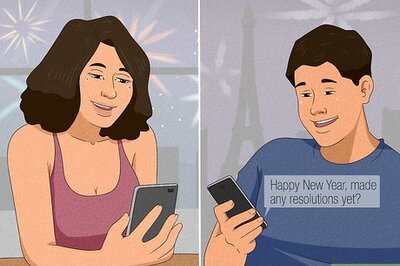
views
Preparing for Your Act
Watch the episodes and the movies over and over. Observe how he behaves. Understand his fears, thoughts, and desires. You could also read the manga, but keep in mind Yoshiyuki Sadamoto, the manga's author and character designer of the first Evangelion anime, sees Shinji differently from Hideaki Anno, its main writer and director.
Wear a Japanese school uniform. Unlike most cosplay, this outfit will not look out of place in day-to-day life. It is a simple: a white short-sleeved button-down shirt, a black undershirt, and a pair of black trousers. Complete the look with a dark leather belt and solid white high-top sneakers. Make sure your dress shirt is made from thick enough material that the black undershirt does not show through. Not only will a sheer shirt make you look less like less like Shinji, but it will also make you look sloppy.
Cut and dye your hair like Shinji's. Luckily, like Shinji's clothes, his hair is simple and normal. Get your hair cut neat and short but not buzzed. Have bangs that are slightly uneven and long, just touching your eyebrows. Give yourself a middle part. Dye your hair very dark brown to match his if necessary. If you would prefer to keep your hair the way it is and are simply working on a Shinji cosplay for a convention, wear a wig instead.
Wear earbuds and listen to music frequently. Shinji uses a fictional technology called an SDAT player that looks similar to a portable cassette player. Although cassette players are now outdated, they are not difficult to find. If you'd rather, you can always use an MP3 player instead. To really get in the mood, listen to classical music, preferably Bach (Suite No.1 Prelude for Cello). In one episode, Shinji wears a T-shirt with XTC written on it, indicating he may also enjoy new wave. Some bands similar in style to XTC include Shriekback, Gang of Four, Talking Heads, The The, and Elvis Costello.
Learn to play cello or another instrument. Although Shinji is ashamed of his perceived lack of skill, he is actually an accomplished cellist. His bashful cello playing has been a trait featured prominently since the original series. He also learns the piano in the more recent film Evangelion 3.0: You Can (Not) Redo.
Acting Like Shinji in Daily Life
Act shy. Shinji is very introverted and prefers to spend his time alone or with a small group of people. He is also very modest and insecure. However, he eventually begins to open up a little to his fellow pilots over the course of the series.
Travel by subway every time you can. A commuter train is Shinji's primary source of transportation. Shinji also rides the train all day to avoid his responsibilities. Additionally, the original series makes heavy use of train motifs.
Seek love and approval. Shinji wants to be loved by everyone, especially his previously estranged father. Shinji cares a lot about what other people think. Be careful with this step. Approval-seeking is associated with low self-confidence and self-esteem. While Shinji has problems with both, preserve your healthy mindset by not getting too into character. A healthy way of gaining approval is to be actively conscientious of other people's feelings. Ask others about their needs and avoid being selfish.
Do as you're told. Because of Shinji's need for outside validation, he often does what authority figures demand. He is extremely passive. Take care of your responsibilities, like homework and assigned chores, when asked. You can mentally compare these tasks to Shinji's obligations to protect humanity. As with the previous step, don't take this one too seriously. Shinji may pilot a giant robot, but don't put yourself in harm's way.
Apologize often. One of Shinji's negative qualities is that he completely lacks confidence and often blames himself for things that aren't his fault. Try not to let this act affect you too deeply. Instead, apologize only when you have done something wrong, or in instances where there is some ambiguity, such as when someone bumps into you or you and your friend have a miscommunication. In general, apologizing too much is a bad idea. If you did nothing wrong, saying "sorry" can make you lose self-confidence.
Don't react to insult or look for a fight. Be kind and nice to others. Shinji is, at heart, a very compassionate character. Although he must fight to protect humanity, he strongly dislikes violence. In addition, he is so passive that he does not outwardly react to insults, even though he is deeply hurt by them. Repeated insults or threats can be considered bullying. If you experience bullying, speak with a teacher if it occurs at school or a manager if it happens at work. If you are a minor, tell your parents. If you feel your safety is threatened, call the police.
Debate with yourself about almost everything you do. Shinji is very introspective and tends to overthink things. Introspection can be healthy. Real-time mindfulness, where you are aware of your feelings in the moment, leads to a happier, more positive life. A healthy amount of self-reflection after stressful events may also help you to better handle similar problems in the future. Remember, Shinji sometimes worried that he was alone and not worthy of living, but in the end realizes that he is loved and controls his life. Despite these realizations, Shinji still deals with self-loathing. This is another case where you shouldn't act like Shinji; remember to always love yourself. Psychologists term unhealthy, obsessive thinking about pain and trauma "rumination." To stay healthy, avoid slipping into rumination. If you find yourself unable to stop, talk to a doctor.




















Comments
0 comment